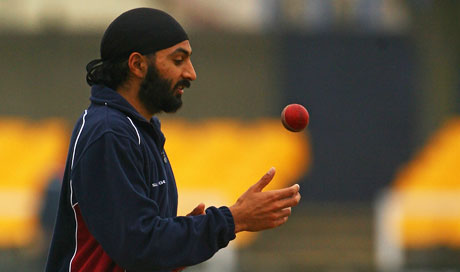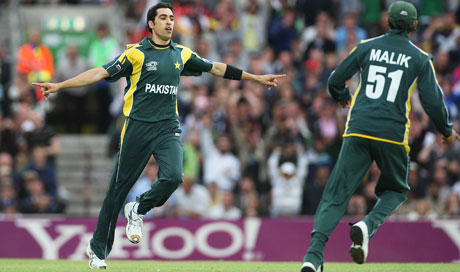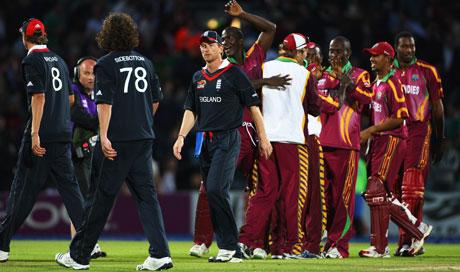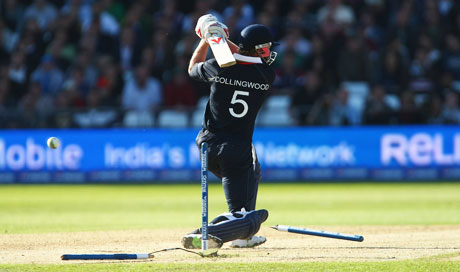RMJ: England have nothing to fear from Australia
June 30th, 2009 by Robin Martin-Jenkins in England, The Ashes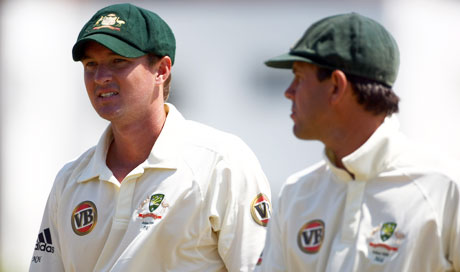
A few weeks ago I had to fill in a questionnaire for Sky Sports. It was for the Twenty20 matches and my answers to their fairly banal questions were due to appear on screen when I went in to bat. You know the kind of thing: What is your favourite band? (Rubber); who is your sporting hero? (Charles Colvile). The last question was ‘What is your Ashes prediction?’ I said Australia would win 2-1.
Some of my teammates saw me write this and immediately were up in arms. “How could you be so unpatriotic?” they protested, as they wrote down 4-1 to England. One player, who shall remain nameless, had even written 5-1 to England. “How can you be so stupid?” I replied.
But I am patriotic; I want England to win as much as the next man, I thought as I sat down in the changing room, before realising I change next to Yasir Arafat on my left and Corey Collymore on my right. But I watched the Australians last series in South Africa and I’ve grown up with a generation of cricket lovers who have, except on two or three occasions, spent every two years cowering behind the sofa as the England team go through a ritual Ashes humiliation. A little bit of realism would creep into the psyche of even the most hard-nosed of patriots given such a pommie-bashing over the years. Crossing sports for a moment, if William Wallace was still alive do you really believe he’d still think Scotland had any chance of winning the Six Nations Rugby next year?
In all good stories, however, the main character has an experience that changes him in some way and alters the course of events. Despite this not being a particularly good story, I too had such an experience: namely, playing the aforementioned pommie-bashers last week at Hove. And for four days we held our own against the No.1 side in the world.
Three weeks of constant sun has turned the outfield at Hove into a brown sheet of concrete and the square is dusting-up into the kind of surface that might even get Mushtaq Ahmed hobbling out of retirement. Ricky Ponting told the press before the match that it would be perfect preparation for the first Test at Cardiff which, he’d heard, was just like Hove. I think we can assume he was talking only about the pitch. And at the end of the match he talked again about how useful the match had been to get his players up to speed for the first Test.
But I’d wager he chose different, rather harsher, words for some of his team in the confines of their dressing room after the match. For while the Australians didn’t play poorly they lacked the presence that the best team in the world should have. All the seamers, except Peter Siddle, looked out of rhythm and their main spinner, Nathan Hauritz, had a shocker. I felt sympathy for Hauritz as he looked like a man who had a whole heap of unnecessary pressure dumped on his shoulders, and he bore his slightly humiliating match figures of 1 for 158 (and this on a turning wicket) well, revealing an impressive temperament.
When it came to the batting all their main players got starts, except Marcus North, but failed to capitalise and, in the case of Phillip Hughes twice, and Ricky Ponting and Simon Katich once, played some very poor shots to get out. Michael Clarke and Brad Haddin apart, they also looked very tentative against our two young spinners, Ollie Rayner and Will Beer. Australian batsmen looking tentative against an off-spinner and leg-spinner on a turning pitch? Hmmm, I wonder who England should pick at Cardiff…?
If this seemed very un-Australian, there was another aspect to their play that seemed unreal too. Sledging, mental disintegration, call it what you will, but there was none of it. I batted for an hour-and-a-half in the first innings and had my usual share of wild flails outside off stump. After each one my ears were primed for the volley of abuse that would surely come my way but not a thing was said. In fact, aside from a bit of geeing-up from the covers the whole team was quiet in the field. It smacked of a fairly new team still coming to terms with each other, which is of course what it is.
They have this week at Worcester to take their preparation one step further and there are a few caveats for England. Namely that Brett Lee bowled with serious pace on a slow wicket, Mitchell Johnson wasn’t even playing and Ponting, Clarke and Haddin exuded class with the bat.
But if I was to give England my own brand of William Wallace team talk now I would say that this year shouldn’t be a time for behind-the-sofa-cowering. England have nothing to fear. Respect them of course, they are a team of fine cricketers. But they have holes in their backsides like anyone else and if you play to your strengths (i.e. play Swann and Rashid on a Cardiff turner) you’ll be one up by the time we go to Lord’s.
My altered Ashes prediction: England to win 3-1.
Robin Martin-Jenkins is an allrounder with Sussex
Posted in England, The Ashes | 2 Comments »


